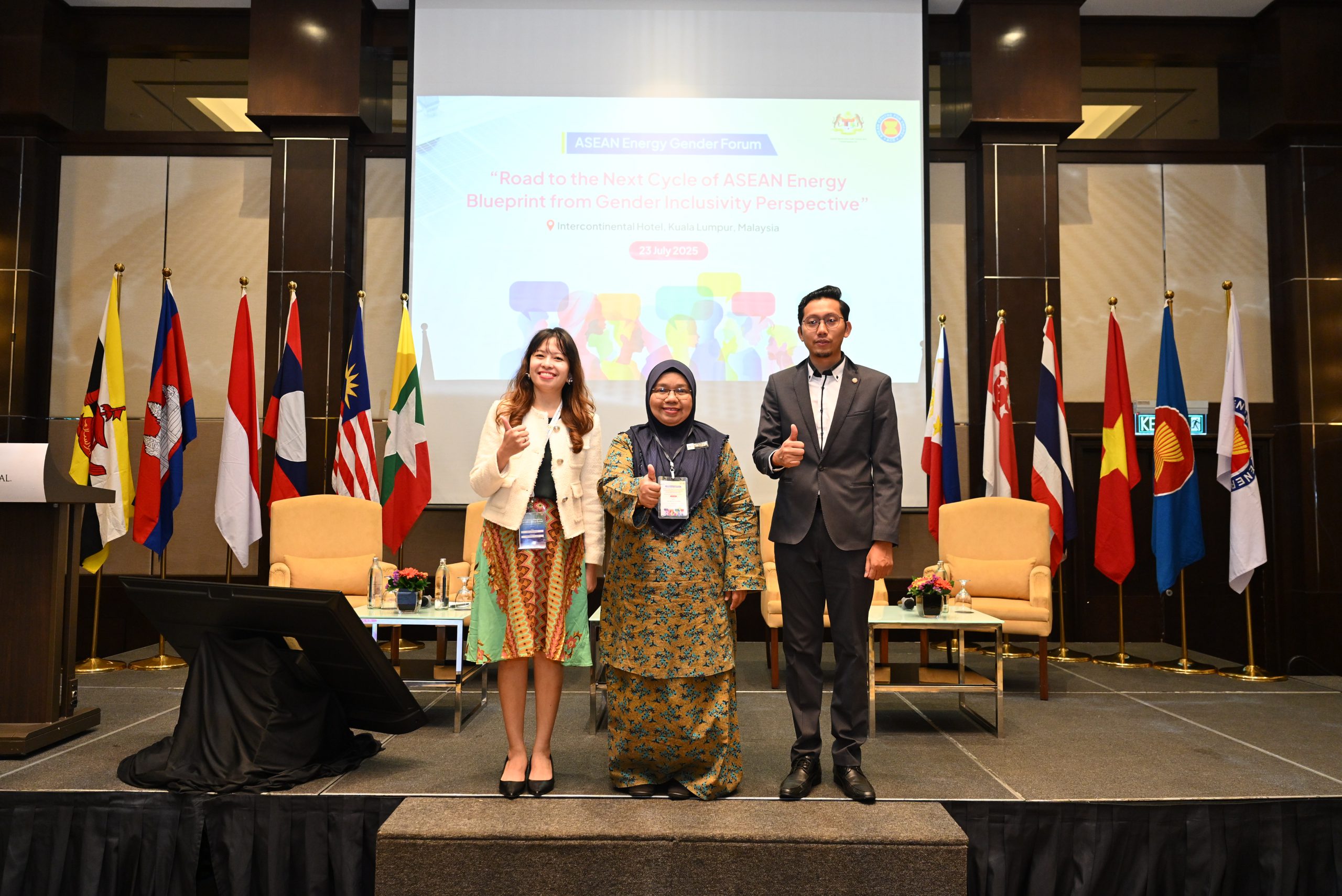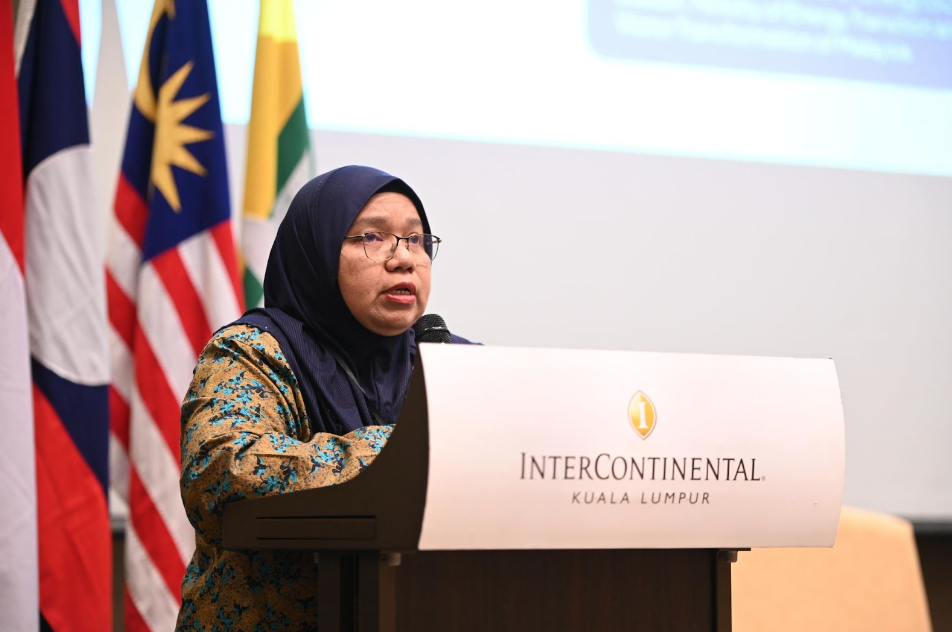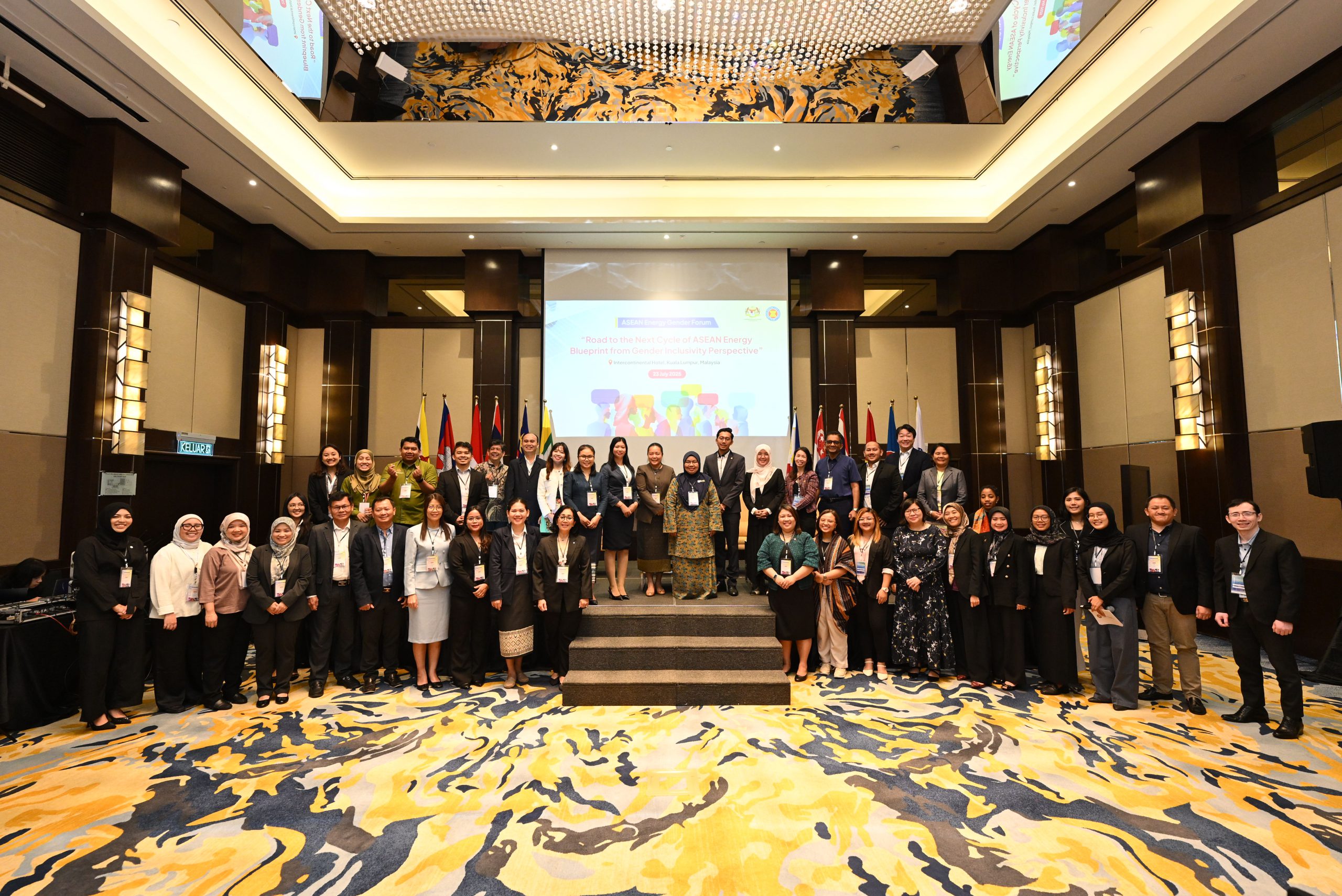Jakarta, 24 July 2025

Photo 1. (Left to right) Aldilla Rakhiemah, Project Manager of ASEAN Climate Change and Energy Project (ACCEPT) Phase II, H.E Morten Paulsen, Ambassador of Norway to Malaysia and Brunei, Puan Mareena Mahpudz, Alternate Senior Official on Energy Leader of Malaysia and Deputy Secretary-General of Ministry of Energy Transition and Water Transformation, and Dr Zulfikar Yurnaidi, Manager of Energy Modelling and Policy Planning (MPP) Department at ACE during the event.
Kuala Lumpur, 24 July 2024 — The ASEAN Centre for Energy (ACE, or the Centre), through the ASEAN Climate Change and Energy Project Phase II (ACCEPT II), accelerates low carbon energy transition in ASEAN by convening a regional policy dialogue held in Intercontinental Hotel, Kuala Lumpur, Malaysia, on 24 July 2025. Hosted by the Ministry of Energy Transition and Water Transformation (PETRA) of Malaysia, the event brought together approximately 50 participants composed of ASEAN Member States (AMS) representatives, international institutions, and regional experts to discuss the region’s progress towards a sustainable, low-carbon future. The policy dialogue was also attended by H.E. Morten Paulsen, Norwegian Ambassador for Brunei and Malaysia.
As the region moves forward with the next phase of the regional energy blueprint, the ASEAN Plan of Action for Energy Cooperation 2026-2030, the new theme of “Advancing Regional Cooperation in Ensuring Energy Security and Accelerating Decarbonisation for a Just and Inclusive Energy Transition” has been adopted. Hence, this policy dialogue comes at a critical time in defining “just and inclusive” in the regional context, serving as a platform for key energy stakeholders in the region to discuss strategies to achieve carbon neutrality while ensuring that no one is left behind.

Photo 2. Group photo of the policy dialogue workshop participants.
Panellists included representatives from ASEAN Secretariat, Ministry of Industry and Commerce Lao PDR, IGES, National Energy Council of Indonesia, SEforALL, Department of Energy Philippines, Ministry of Energy Myanmar, Ministry of Mines and Energy Cambodia, National Climate Change Secretariat Singapore, Oxfam, PwC, and Tenaga Nasional Berhad.
In panel one, “Regional Progress on Low-Carbon Energy System in ASEAN”, experts shared their insights and perspectives on advancing low carbon energy systems across ASEAN. Key takeaways from the discussion included:
Panel two, “Defining Just and Inclusive Energy Transition in ASEAN”, the discussion aimed to deepen regional understanding of justice and inclusivity in the energy transition. The discussion produced three main takeaways:. Participants explored:
Meanwhile, on panel three, titled “Policymaking for ASEAN Energy Transition – Finance, Technology, and Governance”, participants explored how policies in ASEAN are made and what’s needed to enable investment and technology deployment. The key discussion outcomes and recommendations include:

Photo 3. Puan Mareena Mahpudz, Alternate Senior Official on Energy Leader of Malaysia and Deputy Secretary-General of Ministry of Energy Transition and Water Transformation, delivering welcoming remarks.
Puan Mareena Mahpudz, Alternate Senior Official on Energy (SOE) Leader of Malaysia and Deputy Secretary-General at the Ministry of Energy Transition and Water Transformation (PETRA) Malaysia, underscored the importance of this event. “Today’s policy dialogue reaffirms that energy policy cannot be pursued in isolation from climate goals or social equity. As the chair of ASEAN this year, Malaysia is committed to advancing that and championing growth that is not only dynamic, but also sustainable and environmentally conscious”, she said.
Dato’ Ir. Ts. Razib Dawood, Executive Director of the ASEAN Centre for Energy, also echoed the statement, saying, “Transitioning to a low carbon energy system does not only mean transitioning away from fossil fuels. It should also be just and inclusive, ensuring that clean energy must be accessible, affordable, and generate decent employment opportunities, while also empowering vulnerable communities. Therefore, this policy dialogue, delivered through the ASEAN Climate Change and Energy Project, is designed as a platform to deepen our understanding of the evolving energy landscape while aligning with the climate goals. ”
This event was held in line with Malaysia’s 2025 ASEAN Chairmanship under the theme of “Inclusivity and Sustainability”. It serves as a key contribution to advancing strategic approaches to achieve a low carbon energy system in ASEAN, while also ensuring economic growth and social equity.
**
About ASEAN Centre for Energy (ACE)
Established on 1 January 1999, the ASEAN Centre for Energy (ACE) is an intergovernmental organisation within the Association of Southeast Asian Nations’ (ASEAN) structure that represents the 10 ASEAN Member States’ (AMS) interests in the energy sector. ACE supports the implementation of the ASEAN Plan of Action for Energy Cooperation (APAEC), a blueprint for ASEAN energy sector. The Centre is guided by a Governing Council composed of Senior Officials on Energy from each AMS and a representative from the ASEAN Secretariat as an ex-officio member.
The three key roles of ACE:
Keeping the region’s improvement, sustainable and harmless to the ecosystem is a fundamental concern of the ASEAN energy sector. Hosted by the Ministry of Energy and Mineral Resources of Indonesia, ACE’s office is located in Jakarta, Indonesia.
For more information on ACE, check our website: aseanenergy.org.
For further information, please contact:
About ASEAN Climate Change and Energy Project Phase II (ACCEPT II)
The ASEAN Climate Change and Energy Project (ACCEPT) Phase 2 is a collaboration between the ASEAN Centre for Energy (ACE) and the Norwegian Institute of International Affairs (NUPI) is funded by the Norwegian Government, under the Norwegian-ASEAN Regional Integration Programme (NARIP). The 48-month project officially began on 1 November 2022 as a continuation of ACCEPT Phase 1.
One of the key objectives of ACCEPT II is to support the implementation of the ASEAN Plan of Action for Energy Cooperation (APAEC) Programme Area No. 6, Regional Energy Policy and Planning, Outcome-based Strategy (OBS) 6, “Promote Information Sharing on the Energy-Climate Nexus”, which was initiated by ACCEPT Phase 1.
ACCEPT II supports the ASEAN Member States in transitioning to a low-carbon energy system and achieving carbon neutrality. The project enhances ACE’s governance effectiveness on climate-related energy issues, promotes gender equality, and advances knowledge, capacity building, and regional collaboration on the energy-climate nexus.
For further information on ACCEPT II, check our website: accept.aseanenergy.org